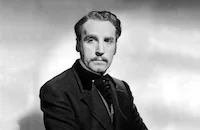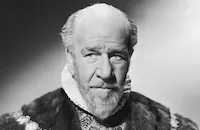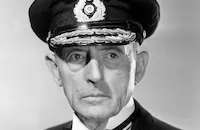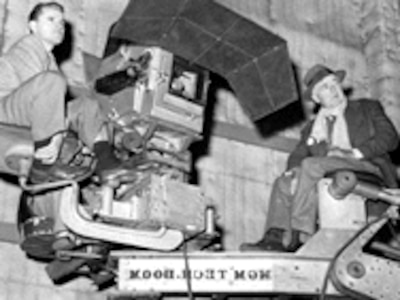Song of Love

Brief Synopsis
Cast & Crew
Clarence Brown
Katharine Hepburn
Paul Henreid
Robert Walker
Henry Daniell
Leo G. Carroll
Film Details
Technical Specs

Synopsis
In Dresden, Germany, in 1839, pianist virtuoso Clara Wieck performs at a command performance of the King. After completing a piano concerto by noted composer Franz Liszt, Clara introduces "Traumerei," a piece composed by her lover, an unknown composer named Robert Schumann. Backstage, Clara is chastised by her overbearing father and teacher, Prof. Wieck, for playing the composition, but Clara replies that she is in love with Schumann. When Schumann asks for the underage Clara's hand in marriage, Wieck forbids the union, declaring that Schumann is unworthy of his famous daughter. Defying her father, Clara petitions the court for permission to marry. Just as the judge is about to rule in her father's favor, Liszt defends the marriage and praises Schumann's talent, thus winning the court's consent. As a wedding gift, Schumann writes a composition for his bride titled "Dedication." Years later, Schumann has failed to attain recognition as a composer and is forced to support his family by giving music lessons. Overburdened with seven young children, Clara has stopped playing the piano to rear her brood. On New Year's Eve, Johannes Brahms, a promising young composer, comes to study with Schumann. Although Brahms is instantly smitten by Clara, Schumann invites him to move into the family's home. At their New Year's party, the family and their guests follow tradition by telling their fortunes with melted tin soldiers. When Schumann's molten glob of metal congeals into the shape of a coffin, the room falls silent. Soon, Brahms becomes an indispensable member of the family, helping with the chores and the children and even convincing the housekeeper, Bertha, who has quit in frustration, to return to work. Strain and overwork start to effect Schumann's mind, though, and he begins to suffer chronic headaches. To help with the family's finances, Clara briefly returns to the concert stage, causing Schumann increased feelings of failure and unworthiness. While Schumann throws himself into completing his opera Faust , Clara declines a lucrative offer to continue on the concert stage. Slipping further into depression, Schumann begins to compose morose, disturbing music, prompting Clara to worry that he may suffer the same fate as his sister, who committed suicide after suffering a nervous breakdown. When Schumann's opera is rejected, Clara hides the bad news from her husband and Brahms turns to Liszt for help. Interceding on his friend's behalf, Liszt convinces Reinecke, the owner of a concert hall, to open his season with Faust . No longer able to bear his unrequited love for Clara, Brahms leaves the Schumann home. While conducting the debut of his opera, Schumann suffers a mental breakdown and is subsequently committed to a mental institution. When, during a visit from Clara, Schumann offers to play his "new" composition, "Traumerei," Clara knows all is lost. Schumann dies shortly thereafter, and five years later, Brahms, now having achieved fame and fortune, comes to visit Clara. Surprised to find Clara still in mourning and having forsaken the piano, Brahms lectures her about her late husband's determination. Resentful, Clara rejects Brahms invitation to join him in Cologne for the debut of his new symphony, but later changes her mind. In Cologne, Brahms is so thrilled to glance up and see Clara in the audience that he whisks her out of the hall in the middle of the concert. Taking her to a wine garden, Brahms proposes to Clara, but when a gypsy violinist plays the strains of "Dedication," Clara realizes that she is still in love with her husband and must preserve his legacy by playing his music throughout the world. Returning to the stage in Dresden, she reprises "Traumerei" for the King.

Director

Clarence Brown
Cast

Katharine Hepburn

Paul Henreid

Robert Walker

Henry Daniell

Leo G. Carroll
Else Janssen

Gigi Perreau
"tinker" Furlong

Ann Carter
Janine Perreau
Jimmie Hunt
Anthony Sydes
Eilene Janssen

Roman Bohnen

Ludwig Stossel
Tala Birell
Kurt Katch

Henry Stephenson
Konstantin Shayne
Cecil Stewart
Leslie Denison
Eloise Hardt
Larry Simms
Francis Pierlot

Byron Foulger

Frank Reicher
Wheaton Chambers
Constance Purdy
Fred Nurney
Fred Essler
Betty Blythe
Bert Roach
George Davis
Helen Eby-rock

Clinton Sundberg
Andre Charlot
Josephine Whittell
Jane Green

Pierre Watkin
Mary Forbes
Winifred Harris
Grandon Rhodes
Torben Meyer
Harold Miller
Lela Bliss
Ruth Robinson
Edna Holland
Guy D'ennery
Helen Dickson
Crew
Robert Ardrey
Johannes Brahms
Clarence Brown
Jack Dawn
Peter Derose
Laura Dubman
Cedric Gibbons
Sydney Guilaroff
Irene
Bronislau Kaper
Robert J. Kern
Franz Liszt
Warren Newcombe
Hans Peters
Walter Plunkett
Al Raboch
Artur Rubinstein
Robert Schumann
Douglas Shearer
William Steinberg
Harry Stradling
Charles Tobias
Ivan Tors
Valles
Allen Vincent
Irmgard Von Cube
Edwin B. Willis

Photo Collections
From the collection of Frank Phillips (used by permission).
Videos
Movie Clip



Trailer
Film Details
Technical Specs

Articles
Song of Love
Paul Henreid had been making films with Warner Bros. since Now Voyager in 1942. Now, Henreid wrote in his autobiography, "My contract with Warners had one more film to go when MGM offered me Song of Love with Katharine Hepburn as the female lead. Clarence Brown, a man I admired tremendously, was to direct, and Artur Rubinstein to play the piano for Katy and me. I was to get $115,000 for making it, a top salary in those days. It was a fabulous deal because Warner Bros. was paying me $75,000 a picture. I realized that, although Warners had no current assignment for me, if I asked Jack [Warner] to release me I would take a chance on his refusal. What I decided to do instead was buy back my contract for $75,000. What actually happened was that Warners simply did not pay me the last $75,000 they owed, and I did the picture for MGM instead. The film, the life story of Robert Schumann, the composer, was a delight to make. Brown, the director, was thoroughly professional and exciting. Katharine Hepburn was lovely and radiant and, in those days, much less mannered as an actress than she is now. She was fun to work with, and working with her introduced me to Spencer Tracy, her intimate friend. He would come to the set each morning, say hello, and then, with a half-smile, ask me, "Is she behaving herself?" Without smiling, I'd say, "Oh yes, Spence. She's being marvelous." "Good. Good." He would turn to Hepburn "Now, Kate, have you learned your lines?" Rather demurely, she'd say, "Yes, dear." He'd go on: "Now, don't forget. Say the lines loud and clear. Don't grin and make faces just say the words." And, grinning at him like a child, she'd say, "Yes, Spence, I will."
Hepburn's film career may have become problematic in the late 1940s but as Charles Higham wrote in his biography of Hepburn Kate: The Life of Katharine Hepburn, "In the mid-1940s, Kate's career had sunk as low as it did in the mid-1930s. But she was so buoyed up by her mutually adoring relationship with Spencer [Tracy], and by the massive MGM studio machinery, which gave her a feeling of enormous confidence, that she never allowed her weaker vehicles to depress her. She did not even balk at an incredibly complicated and foolish script by four writers, Song of Love. MGM must have been firmly in Hepburn's camp, as Darwin Porter in his book Katharine the Great noted that "At the box office, Song of Love fared poorly, both with its critics and with the general public. Even before the film's release, the president of the American Legion called Mayer to inform him that his then powerful organization was going to boycott the film, "because of Hepburn's pinko [Communist] leanings. Don't ever cast Hepburn in another movie, or you'll be sorry you did." Hepburn, as Paul Henreid wrote, had become a supporter of Henry Wallace's Presidential campaign. "Henry Wallace, considered by the American Legion and the Daughters of the American Revolution as a flaming red, was picketed by both organizations, and through the then rampant policy of "guilt by association," our movie, when it opened, was also picketed in Los Angeles. The box office there was poor, but fortunately it did well in other towns. It was a good picture, but not a smash hit."
Politics seems to be the only thing left out in Bosley Crowther's New York Times article, in which he excoriated Song of Love in one of his most hilarious reviews: "A foreword admits that "certain liberties" have been taken with biographical fact. "Certain liberties," indeed! The basic romance of the Schumanns has been reduced to cloying clichés and the brilliance of Brahms and his acid nature have been sloughed off for just a "good-old-Charley" type. Most of the inspirational contact between the Schumanns is coyly explained in saccharine-sweet little glimpses of episodes in their domestic life-familiar troubles with the servants, laughing anxieties over the kids and touching necessities of rebuffing the romantic advances of "Uncle Brahms." According to Hollywood's concept, the greatest of Schumann's works-at least, the one he held the highest-was his now hackneyed "Traumerei" because (that's right, you've guessed it) it was the "theme song" of his and Clara's love. And Brahms' apparent inspiration was the great fondness which all the Schumann's had for him. More vulgar, however, than this story is the persistent way in which Clarence Brown has directed his actors and his camera to achieve the most tear-drenched effects. Not content to let beautiful music, plus a sugary drama, do the job, he has pushed the weepy face of Katharine Hepburn and the St. Bernard orbs of Paul Henreid right up against the eyes of the audience and practically said, "Look, they're suffering! This is sad!" Music becomes but an accompaniment to a succession of close-up "moods." Also Miss Hepburn's performance is one of her familiarly agonized jobs-a compound of soulful expressions, fluttered hands and prideful lifts of the head. And Mr. Henreid's performance of Schumann is stock "tortured-genius"-in spades! As for Robert Walker's solemn posturing as Brahms-well, it's good for a guffaw. And Henry Daniell's Franz Liszt is reminiscent of the Phantom of the Opera on a night out. All of the other performers, including the children, behave as such people always do in Hollywood movies which reduce greatness to banality-which is what this one does." It is not surprising, then, that The New York Times put Song of Love on its list of the "Ten Worst Films of 1947."
Producer/Director: Clarence Brown
Screenplay: Ivan Tors, Irma von Cube, Allen Vincent, Robert Ardrey, based on the play by Bernard Schubert & Mario Silva
Cinematography: Harry Stradling, Sr.
Art Direction: Cedric Gibbons, Hans Peters
Music: Bronislau Kaper, Artur Rubinstein
Film Editing: Robert Kern
Costume Design: Walter Plunkett, Valles
Cast: Katharine Hepburn (Clara Wieck Schumann), Paul Henreid (Robert Schumann), Robert Walker (Johannes Brahms), Henry Daniell (Franz Liszt), Leo G. Carroll (Professor Wieck), Gigi Perreau (Julie), Elsa Janssen (Bertha).
BW-117m.
by Lorraine LoBianco
Sources:
The New York Times: Song of Love,' With Hepburn and Henreid as Schumanns and Walker as Brahms, New Bill at Radio City Music Hall by Bosley Crowther, October 10, 1947.
Kate: The Life of Katharine Hepburn by Charles Higham
Katharine the Great by Darwin Porter
A Remarkable Woman: A Biography of Katharine Hepburn by Anne Edwards
Ladies Man: An Autobiography by Paul Henreid and Julius Fast

Song of Love
Quotes
Trivia
Notes
The working title of this film was A Love Story. The opening credits roll over a sequence in which "Clara" (Katharine Hepburn) is seen playing the piano in a command performance for the King of Bavaria. The order of the opening cast credits differs slightly from that of the closing credits. The film is prefaced by the following disclaimer: "In this story of Clara and Robert Schumann, of Johannes Brahms and Franz Liszt, certain necessary liberties have been taken with incident and chronology. The basic story of their lives remains a true and shining chapter in the history of music." Robert Schumann (1810-1856) met his prospective wife Clara Wieck (1819-1896) when he boarded with the Wieck family while studying the piano with her father. When Robert fell in love with Clara, who, at the time, was a sixteen-year old piano virtuoso, her father opposed the union, forcing the underaged Clara to petition the court to marry. Granted permission, the couple married the day before Clara's twenty-first birthday. Although biographical sources note that Clara loved touring and was a composer in her own right, her musical career was cut short by the arrival of the couple's eight children. In the early 1840's, Robert began to suffer from mental illness and was committed to an asylum after a suicide attempt in 1854. After Robert's death, Clara performed, taught and edited her husband's letters, becoming known as a champion and interpreter of his music. Johannes Brahms (1833-1897) met Robert Schumann in 1853. Schumann championed the young composer and arranged for the publication of his first songs and piano sonatas. Although Brahms was a constant visitor to the Schumann house, he never lived with the family. Brahms never overcame his passion for Clara, who was fourteen years his senior, and remained devoted to her until her death in 1896.
According to an April 1945 Hollywood Reporter news item, M-G-M acquired the rights to Bernard Schubert's and Mario Silva's play in 1939, intending to produce it on Broadway. When the deal fell through, the studio decided to produce the property as a film in which Clara Schumann's role was to be tailored for Ingrid Bergman. According to an M-G-M publicity item contained in the AMPAS Library, Hepburn, whose piano playing, like that of her two co-stars, was dubbed by Artur Rubenstein, learned to play Schumann's "Carnival" for this picture. In addition to the songs listed in the credits, various selections from the music of Schumann, Liszt and Brahms were heard throughout the film. A December 1946 Hollywood Reporter news item notes that Cologne's Gurzenich concert hall, the world's oldest concert hall, which was leveled by the Nazis, was recreated on the M-G-M lot for the film, encompassing a three story sound stage, 75 by 175 feet. Hollywood Reporter news items in Hollywood Reporter and Los Angeles Times add that four of the Schumanns' grandchildren sued Loew's Inc. for $9,000,000 on the grounds that this film was "libelous, invaded their right of privacy and misappropriated a property right." The suit was dismissed. In his October 1954 decision, New York State Supreme Court Justice William C. Hecht, Jr. wrote: "The allegations of the complaint affirmatively admit that Robert Schumann and his sister were insane as depicted in defendant's motion picture."

Miscellaneous Notes
Released in United States Fall October 1947
Released in United States Fall October 1947














